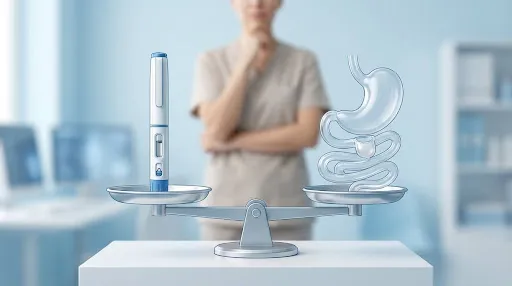|
Fenbendazole, mainly used in animals, is gaining interest among humans for off-label use in cancer and parasite treatment. Some follow unapproved protocols based on personal stories, though human-specific data remains extremely limited and uncertain. |
What if a common dog dewormer could really have effects beyond veterinary medicine?
Sounds surprising, yet “Fenbendazole for humans” has become one of the most debated off-label topics online. Across forums and social media, people are asking: can it truly fight cancer or boost immunity?
While some believe in its potential, others, including scientists, urge caution. This article explores what fenbendazole is, what research says, what the FDA allows, and what’s still unproven; cutting through the noise to bring you the facts.
What Is Fenbendazole?
Fenbendazole is primarily a veterinary drug. Developed to eliminate parasites like hookworms, roundworms, and whipworms in animals, it belongs to a group of medications called benzimidazoles. In simple terms, it stops parasites from using glucose. No sugar, no survival. That’s the crux.
But then something shifted. Anecdotal claims began popping up online suggesting that fenbendazole for humans might do more, like stopping cancer cells. And now, it’s being quietly explored beyond its original purpose.
It is still not permitted by the Food and Drug Administration (FDA) or the European Medicines Agency (EMA) for human use.
That means there’s no official license, no recognised human formulation, and no approval for cancer or any other therapy.
So, while it looks simple on paper, its jump from kennel to clinic is still a long and uncertain one.
Why Are People Using Fenbendazole for Cancer?
Many individuals are exploring fenbendazole for off-label cancer support, often inspired by personal remission stories and the viral “Joe Tippens Protocol.” The growing curiosity stems from anecdotal success reports, early animal research, and easy access to the drug.
Why it’s gaining attention:
-
Claimed tumour control in preclinical animal studies
-
Much more affordable than standard oncology drugs
-
Available online without a prescription
-
Simple to use — capsules, powders, or granules
Still, it’s not all good news. A 2024 review highlighted that neither the FDA nor the EMA has approved fenbendazole for human use. Its pharmacokinetics and safety in humans remain poorly documented, and no regulatory body endorses its use for cancer or anything beyond deworming animals.
How People Actually Use Fenbendazole
Because no medical guideline exists, people depend on shared online experiences. The most common self-reported plan is the Joe Tippens Protocol, combining fenbendazole with curcumin, cannabidiol (CBD) oil, and vitamin E.
Typical Self-Reported Methods:
|
Use Case |
Self-Reported Dose |
Frequency |
Add-ons |
Evidence Level |
|
Active cancer treatment |
444 mg daily |
6 days/week |
CBD oil, curcumin, vitamin E |
Anecdotal |
|
Along with chemo/radiation |
222 mg daily |
Daily |
Curcumin, CBD oil |
Unverified |
|
Relapse prevention |
222 mg 3×/week |
Weekly |
Curcumin |
Anecdotal |
|
Preventive (“prophylactic”) |
222 mg 3×/week for 10 days |
Cyclical |
CBD oil, vitamin mix |
Experimental |
These examples appear across forums but have no clinical validation. No agency confirms safety or dosing accuracy. Some users take capsules after meals containing fat to improve absorption, but again, this comes from personal reports, not human pharmacology data.
Fenbendazole Dosage for Humans – What’s Known and Unknown
Let’s not sugarcoat it. No official fenbendazole human dosage exists. But that hasn’t stopped people from sharing their personal “protocols.” Dosage is usually derived from animal weight conversions, which is risky and inconsistent.
Common Dosage Shared Online:
-
General guideline: 222 mg of fenbendazole daily
-
Higher-intensity regimens: Up to 444 mg/day for short bursts
-
Prevention cycles: Taken 3 days a week, then paused
How to Take Fenbendazole as a Human
People generally consume fenbendazole after high-fat meals. This reportedly improves absorption. Soft gels, powder in water, or mixing with peanut butter are some creative hacks. And yet, none of these methods are medically approved.
Notably, a study demonstrated that fenbendazole combined with vitamin supplements inhibited human lymphoma tumor growth in SCID mice, whereas fenbendazole or vitamins alone showed no significant effect. This suggests synergy matters, but again, mice ≠ and humans.
So when someone asks “how much fenbendazole should a human take,” the honest answer is: no one knows for sure. Always consult a physician. Even if they raise eyebrows at the question.
Potential Side Effects and Risks
No, it’s not “totally safe.” Despite the quiet popularity, fenbendazole side effects aren’t always mild. Human data is still lacking, but animal research shows mostly tolerable outcomes. Still, human bodies aren’t mice.
Known or Suspected Reactions:
-
Mild gastrointestinal issues – Diarrhea, bloating, vomiting
-
Liver concerns – Some anecdotal cases reported elevated liver enzymes
-
Drug interactions – Unknown, but assumed to be possible
-
Long-term toxicity – No established data yet
Some ask, “What are the risks of taking fenbendazole as a human?” Good question. According to existing studies, short-term doses up to 500 mg haven’t shown severe reactions. In rare cases, doses up to 2000 mg didn’t cause catastrophic effects. But again, is fenbendazole safe for humans? No official agency says yes.
Fenbendazole and Liver Toxicity
Fenbendazole liver toxicity is mentioned in online spaces, mostly in cases where users didn’t cycle the drug or paired it with other liver-metabolized substances. Monitoring liver enzymes is recommended if one insists on taking the drug.
Taking breaks during the protocol is often advised, not for tolerance reasons, but to give organs a break.
What Does the Research Say About Fenbendazole in Humans?
There’s curiosity. There’s some hope. But there’s very little conclusive evidence.
Current studies are mostly preclinical. Research in vitro or on mouse cells has shown anticancer properties, especially via blocking glucose metabolism and interfering with tubulin.
A 2008 study showed that combining fenbendazole with vitamins slowed lymphoma growth in SCID mice, but no FDA or EMA approval exists for human use. Pharmacokinetics and safety data in humans remain minimal.
This leaves a frustrating gap between online buzz and scientific legitimacy. Claims often leapfrog from "mice models" to "human miracles" with nothing in between.
Where to Buy Fenbendazole for Human Use
Now comes the shady part. Fenbendazole is easily available, just not through pharmacies.
Common Purchase Sources:
-
Pet stores – Typically labeled for dogs or livestock
-
Online supplement sellers – Often in unregulated capsules
-
Overseas pharmacies – No FDA oversight
Keywords like “buy fenbendazole for humans” or “where to buy fenbendazole for human use” lead to numerous sites, few of which are trustworthy. Some capsules are mislabeled. Others have inconsistent quality.
Always check the product label. Look for third-party testing if possible. And avoid suspicious "too-good-to-be-true" brands. If you’re already risking an off-label use, at least be picky about it.
Should You Consider Taking Fenbendazole?
This one’s personal. But here's the blunt take: don’t self-medicate without a medical consultation.
Yes, there are stories of people taking fenbendazole and claiming cancer remission. But these are not substitutes for clinical proof. Anecdotal evidence is just that, stories, not data.
Anyone wondering “does fenbendazole really work for cancer” or “is fenbendazole a cure for cancer” should take a pause. It might be part of someone’s healing journey, but it’s not a universal cure.
That said, if someone is terminally ill and wants to explore it with a full understanding of the risks, some oncologists might not object. But again, that decision must be medically supervised.
Conclusion
Fenbendazole for humans isn’t magic. It’s not a miracle. But it’s also not entirely fiction. The current science says: proceed with extreme caution. Yes, some believe in it strongly, and yes, early research shows potential. But until solid clinical trials validate its safety, dosage, and effectiveness, it remains in a legal and medical gray zone. Use your head. Talk to professionals. And don’t believe everything that trends.
أسئلة متكررة
How much fenbendazole should a human take?
There’s no standard dosage. Online protocols suggest 222–444 mg daily or a few times a week, but this is anecdotal, not clinical guidance.
What is fenbendazole, and can humans take it?
Fenbendazole is an antiparasitic medicine for animals. Some people take it off-label for cancer, but it’s not approved for humans by the FDA or EMA. Safety in humans remains untested.
Is fenbendazole safe for humans?
Evidence is insufficient. Short-term animal data suggest low toxicity, but human tolerance and metabolism remain unknown. Liver monitoring is essential if anyone experiences any symptoms.
Does fenbendazole really work for cancer?
Preclinical studies show anticancer activity in animals and cell lines, but no clinical proof in humans yet. Controlled trials are urgently needed.
Can I use fenbendazole with chemo or radiation?
Never without medical advice. Interactions are unknown. It may alter how drugs are metabolized within the body.
-User-1754380331.png)
كُتب بواسطة







